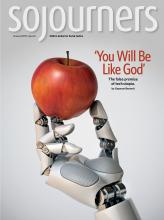I WAS A COLLEGE student in a Southern town—newly out, wrestling with what this meant for my Christian faith, and dealing with daily homophobia on my campus—when I heard that a young man in Wyoming, close to my age, had been brutally murdered for being gay. His name was Matthew Shepard.
The details were horrific. He’d been fiercely beaten, tied to a fence, and left there in the cold for 18 hours. I pictured the scene over and over in my mind, unable to shake it. I couldn’t stop looking at the photos of him in happier times, wondering if we would have been friends—or if it could happen to me. His murder, though far away, made me feel lonelier and more afraid to be myself than I already was.
In October, 20 years after Matthew Shepard was murdered, his remains were laid to rest at the Washington National Cathedral. For many LGBTQ+ people, the interment brought some sense of closure.
Shepard’s death and the horrific murder of James Byrd Jr. are often linked because of Obama-era hate crime legislation named for both. Byrd was an African-American man killed for his race the same year Shepard was killed for his orientation. Byrd was beaten by white supremacists in Texas who urinated on him, tied his ankles to the back of a truck, and dragged him—still alive—for miles.
Read the Full Article

